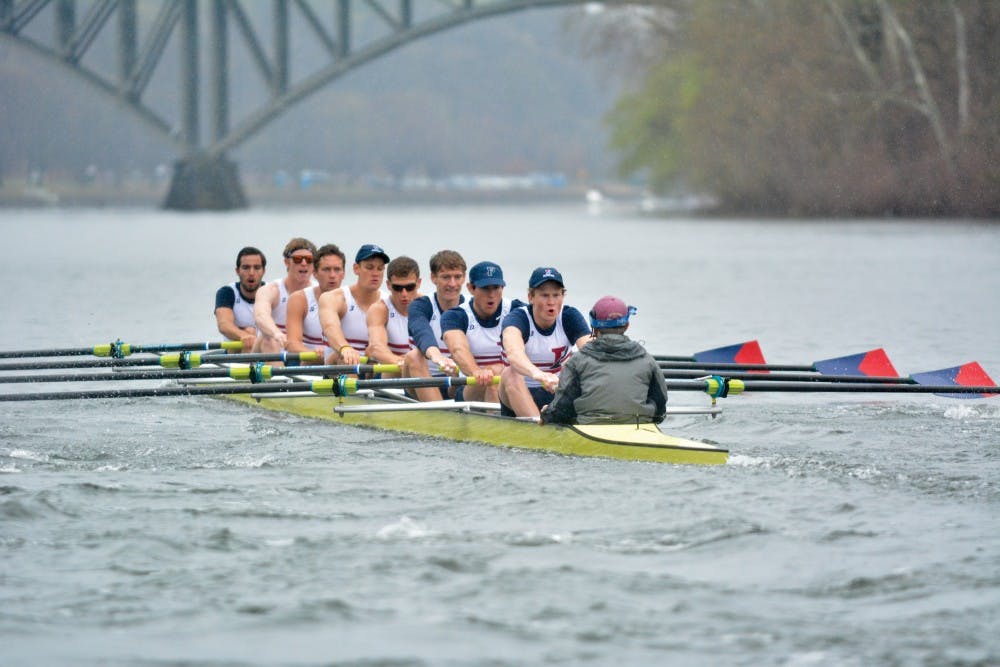They say sports serve as the world’s language — a way to cross international boundaries with ease. Some sporting events truly do unite people, such as the World Cup, while others aren’t quite there yet. For Penn rowing, these bridges are yet to be completed.
Between the men’s and women’s squads, there are only three international athletes of the some 50 total on the rosters. This contrasts uniquely with some of the other Quakers’ teams, which are heavily comprised of student-athletes from across the globe.
With the numbers so skewed, it could perhaps be an unnerving environment for those joining the American-dominated scene at the boathouse.
For freshman Isabella Essex of the women’s team, however, the transition from across the pond from London to Philadelphia has been overwhelmingly enjoyable.
“People are incredibly supportive when you come and I think there’s an appreciation when you come from very far away,” Essex said. “I’ve never really felt ‘wow I want to go home’ because I feel very supported by the people on the team, and they are really great about making sure I have somewhere to go dinner for Thanksgiving and ask what I’m doing about Easter.”
Hailing from the United Kingdom, she is the only European rowing for the Red and Blue, while the crews of the Harvard Crimson and Dartmouth Big Green pull heavily from the prolific stars from the far side of the Atlantic. This contrasts starkly with the powerhouse recruiting power of the Ivies, and raises the question of an international brand name.
Speaking from her own experiences, Essex questions whether top rowers from Great Britain and beyond are truly aware of Penn’s offerings on the Schuylkill. On that point, Essex’s has family in the states, which she credits for her exposure to a larger gamut of collegiate options.
“I think it’s the biggest thing Penn could do is making their presence known more in the UK and Europe because a lot of rowers go to Harvard or Yale or Princeton, but only because those are the names they know,” Essex said. “It’s not so much a preference of one rowing program over Penn’s, just that it’s the name they know. So I think if Penn works to get its name out there more, that would be the biggest thing they could do.”
On the men’s side, sophomore Dutchman Roel Van Broekhuizen echoes the sentiments of it being a warm welcome, provided one has ample ambition.
“I think it’s a pretty welcoming atmosphere. It doesn’t really matter where you’re from; it’s more like if you care about rowing and you’re dedicated then you’ll be welcomed and you’ll fit right in,” Broekhuizen said. “If you like to row and work hard, then that’s all that counts.”
As the only international man on the roster, he recognizes the inherent advantage in pulling globally for forming the best boats around.
“The top crews have a disproportionate number of international athletes compared to the regular student body. So recruiting is an essential aspect to the strength of a program, so pulling from across the globe just increases your recruiting pool,” Broekhuizen said. “If you look at the top crews right now their fastest boats all have a couple of international guys. In Europe, guys will start rowing relatively early so coaches will go out of their way to recruit from outside the U.S there.”
With that said, Broekhuizen concedes a squad certainly does not need to have international athletes to achieve success, but there’s no question it can help a team out.
While maximizing recruiting power seems to be imperative to top teams, Essex questions the extent to which Penn can compete with some of the more established programs when it comes to claiming global rising stars.
“As far as I’m aware, Penn doesn’t have much international recruiting. The new head coach, Wesley Ng, wants to kind of broaden out a bit,” Essex said. “I think Wes knows that and is trying but you can reach out to as many people as you like, but if they don’t recognize or appreciate what you’re offering it’s not necessarily going to get much of reaction when you don’t the same brand name as a Harvard.”
So while Penn rowing may keep their immediate focus on their blade work and rhythm, the best long term strategy may be to work on the global pipelines for the Quaker rowers of tomorrow.









